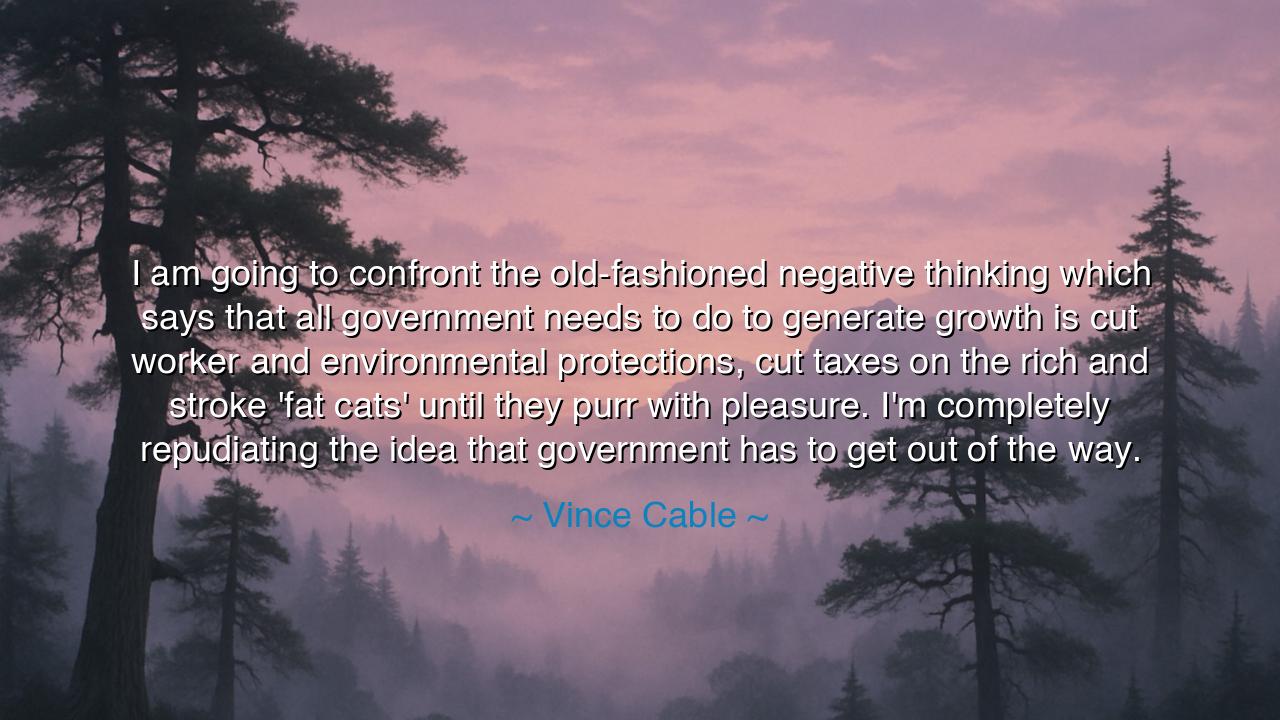
I am going to confront the old-fashioned negative thinking which
I am going to confront the old-fashioned negative thinking which says that all government needs to do to generate growth is cut worker and environmental protections, cut taxes on the rich and stroke 'fat cats' until they purr with pleasure. I'm completely repudiating the idea that government has to get out of the way.






Hear the words of Vince Cable, who declared with courage: “I am going to confront the old-fashioned negative thinking which says that all government needs to do to generate growth is cut worker protections and environmental protections, cut taxes on the rich, and stroke the fat cats until they purr with pleasure. I’m completely repudiating the idea that government has to get out of the way.” This saying is not a mere rebuke, but a challenge to the false idols of our age. It is a cry against the worship of unchecked wealth, a stand against the notion that prosperity flows only when the mighty are appeased and the humble left unguarded.
The origin of this thought lies in the long struggle between two visions of the commonwealth. One vision proclaims that the state is but a hindrance, that its hand must be stayed so that the merchants and lords of gold may prosper unbound. The other vision, to which Cable lends his voice, insists that the government is not a parasite but a shepherd—one who must guard the weak from exploitation, protect the land from ruin, and ensure that growth is not measured by the riches of a few but by the welfare of many. His words echo through history, a counter-song to those who would silence justice in the name of profit.
Look to the story of the Great Depression of the 1930s. Then, the temples of finance collapsed, and millions of common folk fell into despair. The “hands-off” approach of the early years failed, for it left the people prey to hunger and hopelessness. Only when leaders such as Franklin D. Roosevelt rose, proclaiming that the state had a sacred duty to act, did renewal come. Through the New Deal, workers gained rights, protections were laid upon the earth, and bridges, schools, and dams were built that served generations. Thus, Cable’s teaching finds root in history: the government must sometimes be the architect of renewal, not merely the night watchman of wealth.
Consider also the fate of the environment. When industries were left unchecked, forests withered, rivers caught fire, and the skies blackened with soot. Those who said “let the market decide” ignored the cries of the earth and the lungs of the people. It was only when governments stepped forth—when laws like the Clean Air Act and Clean Water Act were forged—that balance began to return. Here again, the lesson resounds: growth that sacrifices health, dignity, and nature is no true growth at all, but a gilded path to destruction.
Cable’s rejection of negative thinking is not merely about economics; it is about the spirit of society itself. For what does it mean to be a people, if not bound by mutual care? To strip away worker protections is to deny the sweat and sacrifice of those whose labor sustains the whole. To cut environmental protections is to betray the inheritance of children yet unborn. To feed the fat cats while the hungry cry out is to enthrone greed where justice should reign. His words are therefore both a warning and a call to arms: the soul of a nation cannot be measured in coins alone.
The lesson for future generations is this: do not be deceived by the soft words of those who preach that prosperity comes only through indulgence of the few. True growth arises when all share in security, when the earth is preserved, when workers are treated not as expendable tools but as sons and daughters of the same human family. The state, imperfect though it may be, is a vessel through which justice can flow, if its leaders are guided by wisdom and courage rather than by the whispers of wealth.
Therefore, let each one act in their measure. Support laws and leaders that uphold justice rather than dismantle it. Speak out when worker rights are threatened. Cherish the earth, and hold governments accountable to protect it. Resist the old chant of “get government out of the way,” and replace it with the higher call: “let government serve the people.” For just as the ancients built walls not to imprison themselves but to shield the city from ruin, so too must we build protections that guard both humanity and nature.
Take this teaching into your life: prosperity without justice is but a fleeting shadow, but prosperity with justice is a foundation that endures. Vince Cable’s words remind us that the task of the people is not to shrink the realm of the government into silence, but to demand that it speak with a voice of fairness, of courage, and of hope. So let the people rise, let their voices join, and let the vision of a just and enduring prosperity guide the steps of nations.






AAdministratorAdministrator
Welcome, honored guests. Please leave a comment, we will respond soon